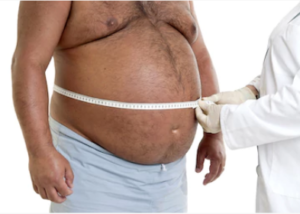Obesity doesn’t just cause serious disease; it also impairs the detection of serious medical conditions.
This isn’t about a physician mistakenly assuming that a patient’s symptoms are being caused by her obesity, and hence, “missing” the proper diagnosis.
This is about excess body fat interfering with the physician’s ability to locate or observe a medical issue.
“Any disease that presents with swelling or enlargement of an organ can be more difficult to diagnose in the very obese,” begins Dr. David Beatty, MD, a retired general practitioner with 30+ years of experience and an instructor of general medicine for 20 years.
People who are very overweight but believe they’re healthy rarely consider the physician’s point of view when it comes to exams.
Though doctors are trained to be very good at feeling and listening for abnormalities, a generous layer of fat will still impede the exam.
Though imaging studies such as ultrasound and MRI are commonly used for diagnostics, along with blood tests, an exam to investigate a patient’s symptoms always begins with the doctor feeling or listening for abnormalities.
Intra-Abdominal Disease

Shutterstock/antoniodiaz
“This is particularly difficult to pick up because it’s harder to feel abdominal organs in an obese person,” says Dr. Beatty.
Unfortunately, some very large social media influencers would take this statement to be fat shaming or fatphobia.
However, it can be proven by placing a pillow over an object, and then seeing how well you can feel that object through the pillow.
If you replace the pillow with a towel, you’ll be able to much better feel the defining characteristics of the object.
A very thick layer of fat will impede a physician’s ability to feel for signs of the following conditions.
Liver enlargement (hepatomegaly). This “can be caused by primary and secondary cancer, cirrhosis, hepatitis, fatty liver, hemochromatosis and hematological disease,” says Dr. Beatty.
Spleen enlargement (splenomegaly). This “is a feature of lymphoma, leukemia, liver cirrhosis, thalassemia, hemolytic anemias, connective tissue diseases (such as rheumatoid arthritis and lupus), amyloid, sarcoid and metabolic disease.”
Dr. Beatty adds, “Colorectal cancers are harder to feel on abdominal examination. Pancreatic cancer might be harder to palpate [feel with the hands]. Kidney swelling due to hydronephrosis or malignancy might be missed.”
Women’s Health Issues
Dr. Beatty says that a doctor can feel a pregnancy via an abdominal palpation at 12 weeks along in a woman at a healthy weight.
“In the obese this might not be felt until much later in the pregnancy. The lady, and others, may not notice the pregnancy until later. Ectopic pregnancy and pelvic infection might be missed.
“Ovarian cysts and cancers can grow to be very large before causing any symptoms. They are often silent in the early stages and are often diagnosed late even without obesity.
“Vaginal examination is less likely to reveal abnormalities in the larger person.”
A self-exam of the breasts, as well as a clinical exam, is more likely to miss a lump in a breast with excess fat due to obesity – even if the breast is considered mostly “fatty” rather than fibrous or dense.
Chest Exams

Shutterstock/uzhursky
“With a large chest, the heart sounds are quieter when listening through a stethoscope,” says Dr. Beatty.
“Murmurs representing valvular heart problems can be missed, and other information about heart size may be masked.
“When examining the chest the doctor inspects the chest wall movement with breathing, taps the chest for percussion note and listens to the breath sounds. Each step in the chest examination is less reliable with obesity.
“Infections, asthma, COPD and pleural effusions can be harder to assess.
“Chest X-rays can also be more difficult to assess. The extra fatty tissue partly obscures the view.”
Lung Exams
“Lung function tests can be more difficult to interpret,” continues Dr. Beatty.
“If the air is being blown out of the lungs more slowly than usual this might be due to lung disease — or it might just be that the muscles of the chest wall are having to move more weight to move the air.”
Fluid Retention

Shutterstock/Valerio Pardi
Dr. Beatty explains, “Fluid retention is fairly common in the obese, usually manifested as swollen legs. Sometimes this is due to varicose veins (which might be less obvious than in a thin person).
“Sometimes the swelling can be a symptom of heart failure, or even renal or liver failure.”
Miscellaneous Medical Conditions
Though obesity is a common cause of high blood pressure, this condition can also be over-diagnosed in very overweight individuals.
“With a larger arm the doctor should use a wider blood pressure cuff to give an accurate BP.
“If a normal sized cuff is used on a large arm, the BP reading can be artificially high.”
It’s important to note that this rule would also apply to a bodybuilder’s arm, even though there may be low body fat.
“Lymph gland swelling (lymphadenopathy) caused by some infections and some cancers may be harder to feel.
“Thyroid swellings may be more difficult to find.
“Skin swellings like abscesses or lipomata (usually innocent fatty lumps) might not be noticed.”
Excessive body fat can also impair exams of the joints and spine.
As you can see, this list is pretty comprehensive. One need not be a physician to appreciate the concept of obesity hindering the efficacy of routine and diagnostic medical exams.
To put this in a rudimentary way, being fat means that something is in the way.
Potential Killer Missed Due to Obesity
Though many of the above-mentioned conditions can be fatal, there’s one in particular in which the first symptom can kill the patient.
An abdominal aortic aneurysm is an enlargement of a section of the aorta as it runs through the abdomen (from the heart), delivering oxygenated blood to the lower body. If an aneurysm ruptures, the patient can bleed out in minutes.
A doctor is better able to detect this surgically-repairable condition with their hands on the patient’s belly if there is less fat below the skin.
Specific Medical Exams Made Harder by Obesity
“Abdominal ultrasound is especially impacted by obesity,” says Dr. Beatty. “Time and again the report comes back Normal but exam limited due to body habitus.
“Echocardiography is also less sensitive when performed through a large chest wall.
“Lumbar puncture is technically more difficult and may fail completely.
“Colonoscopy and gastroscopy are both more difficult and riskier.
“Laparoscopy of the abdomen is more difficult in the obese. Procedures listed for keyhole surgery may have to be converted to open surgery.”
It Is NOT Okay to Be Fat

Michael Coghlan/Adelaide, Australia
Do not let body positive or “fat liberation” influencers deceive you, despite the massive followings that some of them have.
It’s easy for a savvy marketing genius to rope in hundreds of thousands of gullible, impressionable followers with words that those followers desperately want to hear – even though the influencer herself may not even believe them!
If you’re confused, then simply follow the science, medical research, facts and common sense.
 Dr. Beatty has worked in primary medicine, surgery, accident and emergency, OBGYN, pediatrics and chronic disease management. He is the Doctor of Medicine for Strong Home Gym.
Dr. Beatty has worked in primary medicine, surgery, accident and emergency, OBGYN, pediatrics and chronic disease management. He is the Doctor of Medicine for Strong Home Gym.
 Lorra Garrick has been covering medical, fitness and cybersecurity topics for many years, having written thousands of articles for print magazines and websites, including as a ghostwriter. She’s also a former ACE-certified personal trainer.
Lorra Garrick has been covering medical, fitness and cybersecurity topics for many years, having written thousands of articles for print magazines and websites, including as a ghostwriter. She’s also a former ACE-certified personal trainer.
.



























